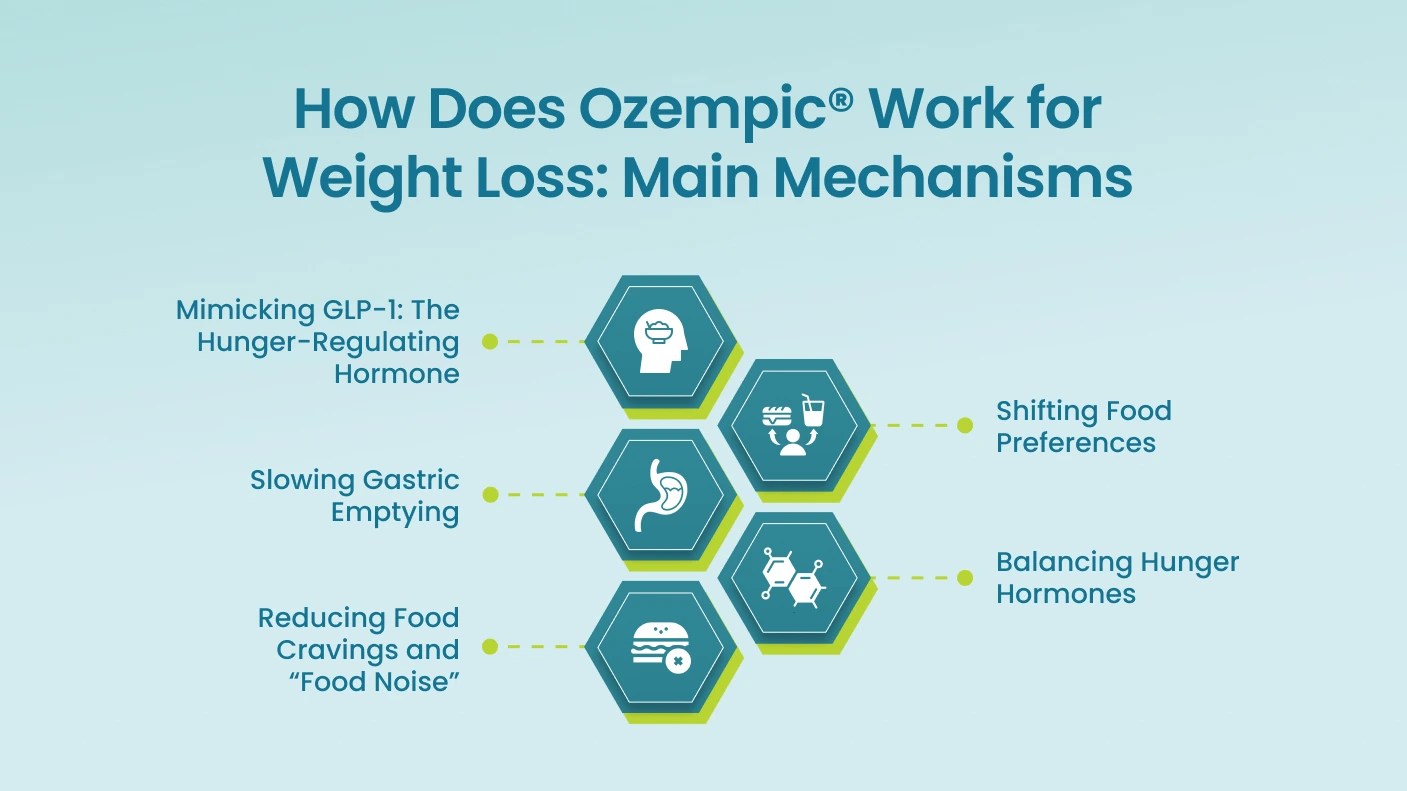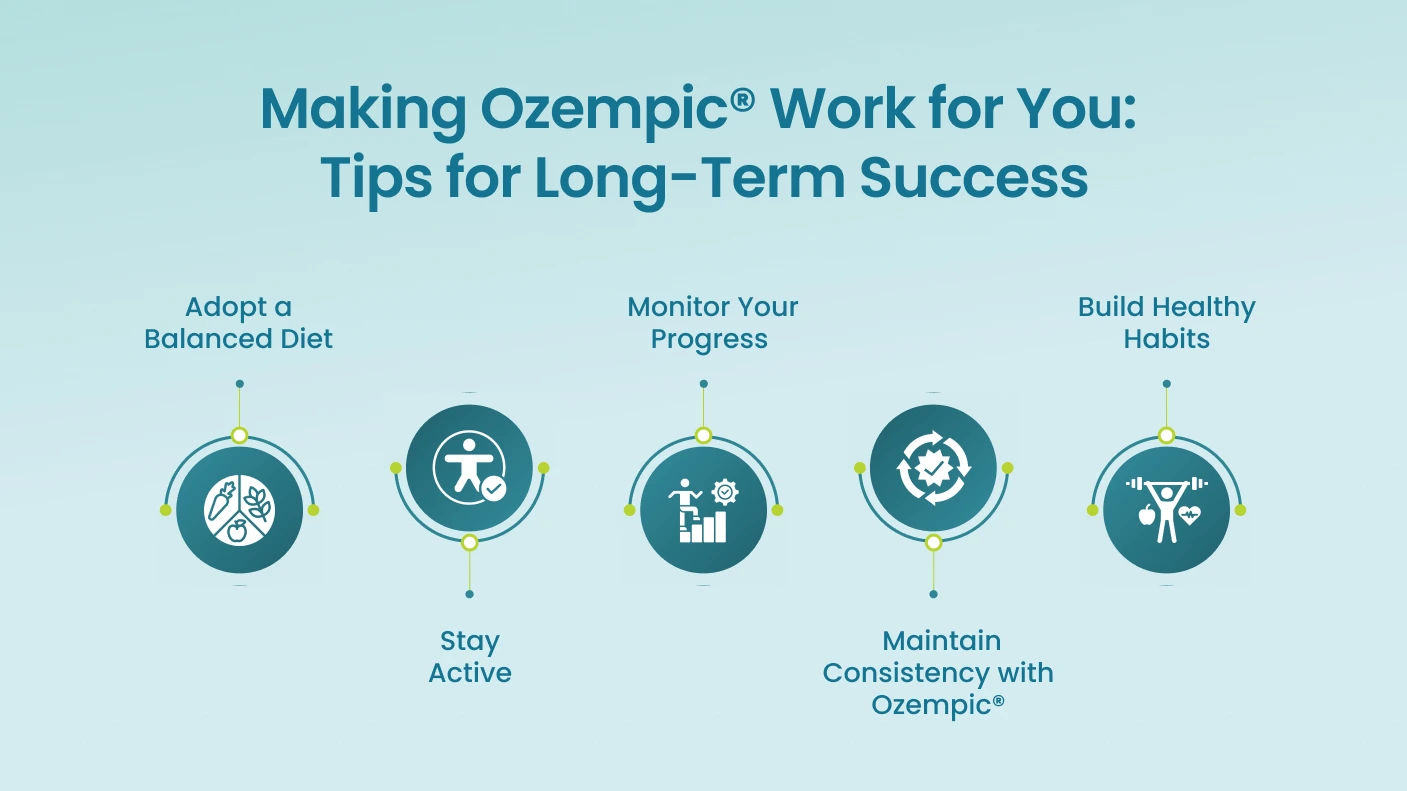
How Does Ozempic® Work for Weight Loss?
Worldwide obesity has nearly doubled since 1990, with over 2.5 billion adults being overweight. Diet and exercise alone don’t deliver the results people seek, which is where medical advancements come into play.
Ozempic® has become a popular option—not just for managing type 2 diabetes but also for weight loss. Ozempic® helps control hunger and increase fullness, making it effective for managing weight-related health issues alongside lifestyle changes.
In this blog, we’ll explore how Ozempic® works for weight loss and if it’s the right option for you.
What Is Ozempic®?
Ozempic® is a brand-name prescription medication used primarily to improve blood sugar control in adults with type 2 diabetes. In addition to its use in diabetes management, Ozempic® is also known for its benefits in weight loss. Its active ingredient, semaglutide, belongs to a class of drugs called GLP-1 receptor agonists, which work by mimicking the body’s natural hormones to regulate appetite, blood sugar, and digestion.
If you want to understand how semaglutide, the active ingredient in Ozempic®, contributes to weight management, check out our detailed guide on How Semaglutide Works for Weight Loss.
Who Is It For?
Ozempic® is recommended for individuals who:
- Have a BMI of 30 or higher (classified as obesity).
- Have a BMI of 27 or higher with conditions such as high blood pressure, type 2 diabetes, or high cholesterol.
- Struggle with sustained weight loss through diet and exercise alone.
How to Use Ozempic®
Ozempic® is a once-weekly injectable medication administered under the skin (subcutaneously). To maximize its effectiveness, it’s important to maintain a balanced, calorie-controlled diet and engage in regular physical activity.
Ozempic® can support long-term weight loss and improve overall health when combined with these healthy lifestyle changes. Understanding the function and benefits of Ozempic® can assist you in determining if it’s suitable for your weight loss objectives.
How Does Ozempic® Work for Weight Loss: Main Mechanisms

Ozempic® aids weight loss by addressing hunger and metabolism through its active ingredient, semaglutide. Here’s how it works:
1. Mimicking GLP-1: The Hunger-Regulating Hormone
GLP-1 is naturally produced in the gut and signals the brain when the body feels full. Ozempic® binds to GLP-1 receptors, improving this natural process to:
Suppress appetite: It tells your brain’s hunger centers that you’ve had enough, reducing food intake.
Regulate blood sugar: This improves insulin response and controls blood sugar spikes, creating a stable weight-loss environment.
Support fat loss: Balanced glucose levels help reduce fat storage, promoting healthier weight management.
2. Slowing Gastric Emptying
Ozempic® slows the movement of food from the stomach to the intestines. This keeps you feeling fuller for longer after meals, reducing the urge to snack or overeat. While this effect diminishes slightly over time, it is essential to early weight loss success.
3. Reducing Food Cravings and “Food Noise”
Beyond physical satiety, Ozempic® impacts areas of the brain that regulate cravings and reward-driven eating. Many users report a reduction in “food noise,” the constant preoccupation with thoughts of food. This can be particularly beneficial for those struggling with emotional eating or binge-eating behaviors.
4. Shifting Food Preferences
Clinical studies suggest that Ozempic® may influence food choices by reducing cravings for high-calorie, sugary, or fatty foods. Users often notice a natural inclination toward healthier eating habits, supporting long-term weight management.
5. Balancing Hunger Hormones
Weight loss can trigger an increase in hunger hormones like ghrelin, often leading to weight regain. Ozempic® helps counteract this response by stabilizing hunger signals and improving the regulation of leptin, the hormone responsible for signaling fullness.
Clinical Evidence: Is Ozempic® Effective?
Ozempic® (semaglutide) has been extensively studied in clinical trials, demonstrating its effectiveness in supporting weight loss for individuals with obesity or overweight conditions. Here’s a look at the key findings from the clinical research:
Results from Clinical Trials
In one of the landmark studies for semaglutide, conducted by the STEP (Semaglutide Treatment Effect in People with Obesity) program, participants treated with Ozempic® experienced significant weight loss compared to those on a placebo. The results from these trials consistently show that semaglutide can lead to an average weight reduction of 15-20% of total body weight.
- STEP 1: In the STEP 1 trial, which involved people with obesity (without diabetes), participants using Ozempic® 2.4 mg lost, on average, 14.9% of their body weight after 68 weeks.
- STEP 2: For people with type 2 diabetes, the STEP 2 trial showed an average weight loss of 9.6% after 68 weeks of using Ozempic®.
These findings align with the FDA-approved dosage of Ozempic® (2.4 mg weekly) for weight loss. It’s important to note that the weight loss was accompanied by improvements in other health markers, including better blood sugar control and a reduction in certain risk factors associated with obesity, such as cholesterol levels.
Comparison with Placebo Groups
The comparison between participants who received Ozempic® and those who received a placebo in these trials highlighted the drug’s superior effectiveness in weight loss.
- In the STEP 1 trial, participants on a placebo lost an average of 2.4% of their body weight, significantly less than those receiving semaglutide.
- Similarly, in the STEP 2 trial, those on a placebo experienced minimal weight loss of just 0.9%, while those taking Ozempic® saw a much higher reduction in weight.
These results highlight the effectiveness of Ozempic® in supporting meaningful and sustained weight loss compared to a placebo, showcasing its potential as a highly effective weight management treatment.
Possible Side Effects and Risks of Ozempic®
Like any medication, Ozempic® comes with potential side effects. While many tolerate it well, understanding the possible risks is essential for making an informed decision.
Common Side Effects
These side effects are generally mild and improve as your body adjusts to the medication:
Nausea: The most frequently reported side effect, especially when starting treatment.
Vomiting or Diarrhea: Often temporary and manageable with dietary adjustments.
Constipation: You can feel constipated as the digestive system slows down.
Abdominal Discomfort: Includes bloating or mild pain.
Less Common but Serious Risks
In rare cases, Ozempic® may lead to more severe complications:
Pancreatitis: Signs include persistent abdominal pain and nausea. Seek medical attention immediately if suspected.
Thyroid Tumors: Animal studies have shown a risk of medullary thyroid carcinoma. Although rare in humans, discussing family history with your doctor is essential.
Gallbladder Issues: Including gallstones or inflammation, which may present as upper abdominal pain.
Who Should Avoid Ozempic®?
Ozempic® may not be suitable for everyone. It’s essential to consult your doctor, especially if you:
- Have a personal or family history of medullary thyroid cancer.
- Have a condition called multiple endocrine neoplasia syndrome type 2 (MEN 2).
- Are pregnant, breastfeeding, or planning to become pregnant.
- Have a history of severe gastrointestinal issues or pancreatitis.
Tips for Managing Side Effects
- Start with the lowest dose as prescribed to minimize side effects.
- Eat smaller, low-fat meals to ease digestive discomfort.
- Stay hydrated, particularly if experiencing nausea or diarrhea.
- Report persistent or severe symptoms to your healthcare provider immediately.
While Ozempic® can be highly effective for weight loss, using it under medical supervision ensures the benefits outweigh the risks.
Making Ozempic® Work for You: Tips for Long-Term Success

While Ozempic® can be effective for weight loss, its benefits are maximized when combined with healthy lifestyle changes. To achieve lasting results, you must integrate Ozempic® into your daily routine alongside diet, exercise, and ongoing support. Here’s how to make the most of your Ozempic® treatment:
1. Adopt a Balanced Diet
Ozempic® works best when paired with a nutrient-rich, calorie-controlled diet. Focus on whole foods like vegetables, fruits, lean proteins, and whole grains while minimizing processed foods, added sugars, and unhealthy fats. This will help maintain steady blood sugar levels and prevent overeating, enhancing the weight loss process.
2. Stay Active
Regular physical activity boosts metabolism and supports weight loss. Aim for cardiovascular exercises (like walking, cycling, or swimming) and strength training (such as weightlifting or bodyweight exercises). Exercise can also help manage side effects and improve overall well-being.
3. Monitor Your Progress
Tracking your food intake, physical activity, and emotional health can provide valuable insights. Use apps, journals, or consultations with a healthcare provider to stay on top of your goals and make necessary adjustments to your plan.
4. Maintain Consistency with Ozempic®
Ozempic® is most effective when used consistently. Stick to the prescribed dosing schedule, and don’t skip doses. It’s also important to check in regularly with your healthcare provider to adjust the medication if necessary and to monitor any side effects.
5. Build Healthy Habits
Incorporating small, sustainable changes into your daily routine—like drinking more water, getting adequate sleep, and managing stress—can complement the effects of Ozempic® and help you achieve a balanced lifestyle.
Ozempic® is a powerful aid for weight loss, but to achieve long-term success, it’s essential to integrate it into a holistic approach to health and well-being. Integrating medication with lifestyle changes can build lasting habits and create lasting, meaningful results.
Lose Weight Effectively with Ozempic® by IV Drips

Are you ready to begin your weight loss journey with the support of Ozempic®? At IV Drips, we’re here to help you unlock your best self through personalized medical support and customized weight loss programs.
With our tailored approach, you’ll receive ongoing guidance from board-certified professionals, ensuring safe and effective treatment at every step. Our comprehensive program includes personalized dosage plans, continuous follow-ups, and Ozempic® delivered directly to your doorstep for complete convenience. Plus, we offer holistic support with tailored dietary recommendations and wellness strategies to help you achieve lasting success.
At IV Drips, we believe everyone deserves individualized care and are committed to improving their health potential. Take the next step towards a healthier, more vibrant you.
Contact us today to start your weight loss journey with Ozempic®!
FAQs About Ozempic® for Weight Loss
How soon can I see results after taking Ozempic®?
Many users begin to notice a reduction in appetite and some weight loss within the first 4 to 8 weeks of starting Ozempic®. However, it may take longer to see significant changes, mainly when used alongside a healthy diet and exercise routine.
Is weight regain likely if I stop using Ozempic®?
If you discontinue Ozempic®, you may experience some weight regain, as the medication plays a crucial role in controlling hunger and regulating blood sugar. To maintain weight loss, it’s important to continue healthy lifestyle habits like diet and exercise even after stopping the medication.
Is Ozempic® covered by insurance?
Insurance coverage for Ozempic® varies depending on your plan and the reason for its use. It’s more likely to be covered for individuals with type 2 diabetes or obesity-related health conditions. Be sure to check with your insurance provider to understand your coverage options.
Does Ozempic® curb cravings for specific foods?
Yes, Ozempic® has been shown to reduce cravings for high-calorie and sugary foods. Many users report a shift toward healthier eating patterns as their overall appetite decreases and food cravings become less intense.
How does Ozempic® compare to Wegovy®?
Ozempic® and Wegovy® contain the same active ingredient, semaglutide and work through similar mechanisms to support weight loss. The primary difference is in their approved uses—Ozempic® is typically prescribed for managing type 2 diabetes, while Wegovy® is specifically approved for chronic weight management. Both medications are effective, but Wegovy® is generally considered the first-line option for weight loss.
Can Ozempic® help individuals with PCOS?
While Ozempic® is not specifically approved for polycystic ovary syndrome (PCOS), its ability to regulate blood sugar and manage weight may benefit those with PCOS. Weight loss and improved insulin sensitivity can help manage PCOS symptoms. Always consult with a healthcare provider for personalized advice and treatment options.
Ozempic® provides a proven, science-based solution for weight loss, especially when combined with healthy lifestyle changes like a balanced diet and regular exercise. But to get the best results, it’s important to take a personalized approach that fits your specific health needs. The first step is to talk to your healthcare provider to see if Ozempic® is the right choice for your weight management goals.
If your healthcare provider gives you the green light, you can count on IV Drips to help you with your weight loss journey.
Posted on behalf of IVDrips










